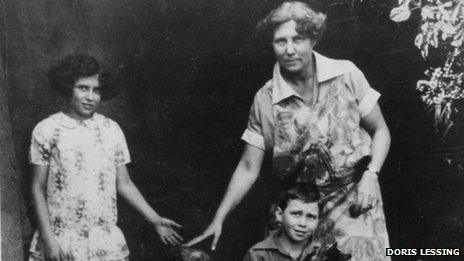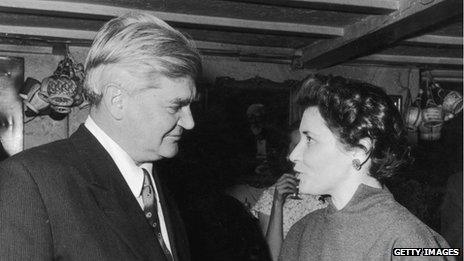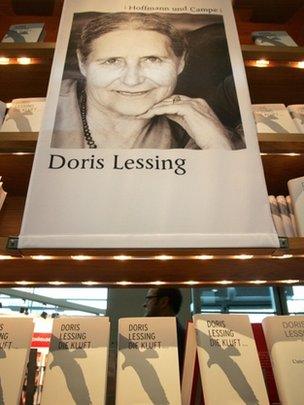Obituary: Doris Lessing
- Published
Nick Higham looks back at the life of novelist Doris Lessing
A look at the life of Doris Lessing, the controversial novelist whose themes ranged from social justice to feminism and science fiction, who has died at the age of 94.
Doris Lessing incurred the wrath of many Americans by suggesting that the 9/11 attacks were not that terrible when compared with the IRA campaign in the UK.
The remarks were typical of an author who never sought to avoid controversy both in her public utterances and her writings.
Doris May Tayler was born in Kermanshah, in what is now western Iran, where her British father was a clerk with the Imperial Bank of Persia.
In 1925 the family moved to Southern Rhodesia, now Zimbabwe, to run a maize farm, though the venture was not a financial success.
Her childhood was dominated by her overbearing mother, who was determined that her daughter would conform to a strict set of rules.
Lessing's only escape from what she described as a miserable existence was into the African bush, which she explored with her brother Harry.
Marriage
She later commented that unhappy childhoods seem to produce fiction writers. "Of course, I wasn't thinking in terms of being a writer then," she said. "I was just thinking about how to escape, all the time."
Her parents sent her to an all-girl's school in the capital, Salisbury. But Lessing dropped out at the age of 13, effectively ending her formal education.
Instead she fed her imagination with parcels of books ordered from England, discovering Dickens and Kipling early in life as well as inventing bedtime stories for her brother.

Lessing as a child, pictured with her mother and brother
She was also influenced by her father's bitter memories of his service in World War I, which had left him crippled.
"We are all of us made by war," she wrote, "twisted and warped by war, but we seem to forget it."
Lessing left home when she was 15 and took a job as a nursemaid, where her employer gave her books on politics and sociology to read.
In 1937 she moved to Salisbury, where she met and married Frank Wisdom. They had two children, but the marriage failed and she left the family home.
Science fiction
Remaining in Salisbury, she became involved with a Communist book club, one of whose central members was Gottfried Lessing.
The pair subsequently married - although, once more, the union was short-lived.
Lessing became disillusioned both with Communism and with Africa and moved to London where her first novel, The Grass is Singing, was published in 1949.
The story of the wife of a white farmer and her affair with an African servant became an instant best-seller and broke new ground in its description of an interracial relationship.
Lessing's breakthrough novel, and perhaps her most controversial, was The Golden Notebook, published in 1962.

Lessing talking to Aneurin Bevan in 1957
A multi-layered story about the different areas of one woman's personality, her passions and hatreds, it is by far the most complex, and longest, work she ever produced.
The book made Lessing an icon of the fast-growing feminist movement. Typically, though, she could not resist baiting the sisterhood.
"What they would really like me to say is, 'Ha, sisters, I stand with you side by side in your struggle toward the golden dawn where all those beastly men are no more.'
"Do they really want people to make oversimplified statements about men and women?"
Nobel laureate
By the late 1970s Lessing abandoned social themes for science fiction with her Canopus in Argus series, which she describes as her best work.
In it she outlined a bleak vision of the future with tyranny and natural catastrophes becoming the norm.
The critic, Paul Schlueter, noted that Lessing's "high seriousness in describing Earth's own decline and ultimate demise is as profoundly apocalyptic as ever".

The author had a worldwide readership
She also produced startling novels, such as the semi-autobiographical Children of Violence series and Briefing for a Descent into Hell (1971), a frightening and surreal examination of mental illness.
More recently, Lessing produced novels like The Good Terrorist (1985), a satire on romantic politics, and The Fifth Child (1988), about the havoc wreaked on a family by an anti-social and violent child.
Lessing said the book had been partly inspired by her own experience of giving birth at 19 and the woman in the next bed, already a mother of two girls, harshly rejecting the son she had just had.
In October 2007 she became the oldest ever winner, and only the 11th woman in 106 years, to win the Nobel Prize for Literature.
"There's something abrasive in me because I have often made people very cross," she once said.
As a writer, however, it was important for her not to care what other people thought.
"We are free... I can say what I think. We are lucky, privileged, so why not make use of it?"
- Published17 November 2013